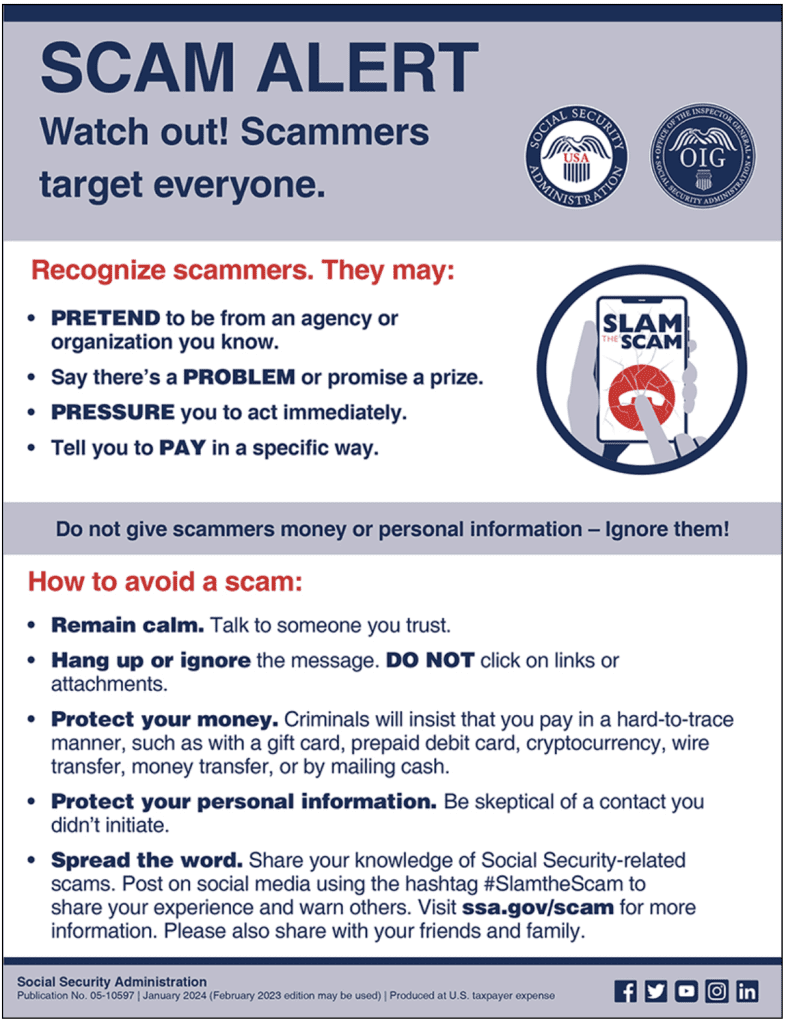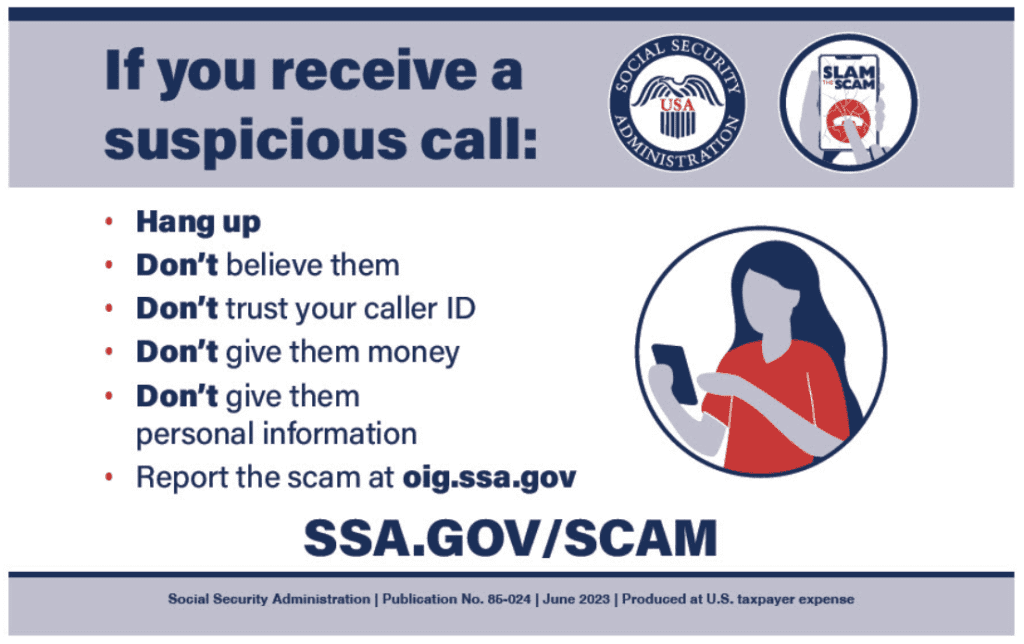 We all get excited as the weather warms up, and spring comes into view. While you are looking forward to and planning your spring break trips, beware! Travel scams are just one of the many scam warnings that have been issued lately.
We all get excited as the weather warms up, and spring comes into view. While you are looking forward to and planning your spring break trips, beware! Travel scams are just one of the many scam warnings that have been issued lately.
National Slam the Scam Day took place last week, an effort to raise awareness about government imposter scams (people posing as important officials who are just after your money). The NJ Attorney General has publicized caution about cold calls from people claiming to be the IRS, and other agencies have warnings out as well. Additionally, Real Estate scam warnings have been shared recently by the Mercer County Clerk’s office.
So how do you know what is real? We’ve got the warnings and the resolutions.
RENTAL SCAMS
 The Better Business Bureau (BBB) says it is easy to fall into a rental scam, but there are simple ways to ensure that the accommodations you reserve are legitimate, and your payments are secure. When planning for spring break, for example, be weary of rentals by owner and hotel cons. The most secure way to do so is to use legitimate booking sites that guarantee you are booking a real place from a site with a proven track record. Once you do commit, make sure you get the logistics in writing and when paying, never use a prepaid debit card where the money is automatically handed over with no trace. Many credit cards have consumer protections, so should you end up in a bind, they often have you covered.
The Better Business Bureau (BBB) says it is easy to fall into a rental scam, but there are simple ways to ensure that the accommodations you reserve are legitimate, and your payments are secure. When planning for spring break, for example, be weary of rentals by owner and hotel cons. The most secure way to do so is to use legitimate booking sites that guarantee you are booking a real place from a site with a proven track record. Once you do commit, make sure you get the logistics in writing and when paying, never use a prepaid debit card where the money is automatically handed over with no trace. Many credit cards have consumer protections, so should you end up in a bind, they often have you covered.
Once you arrive, the BBB warns to be careful how you spend your money. For example, if the front desk calls and implies there is a problem with your credit card, do not share your account number with them over the phone – it could be an imposter. Instead, go to the front desk and sort things out. Similarly, there is a fake food delivery scam that targets tourists. If you want to order in, ask the front desk for recommendations. Scammers can leave fake menus under doors, and then steal your information when you call and pay for food over the phone.
GOVERNMENT IMPOSTER SCAMS
 While you can succumb to a bait and switch, someone pretending to be someone else is the most common scam recently. The current trend – impersonating a government official.
While you can succumb to a bait and switch, someone pretending to be someone else is the most common scam recently. The current trend – impersonating a government official.
A consumer alert was issued by the NJ Attorney General’s office warning of a government imposter scam that turns up about this time every year, as people prepare their tax returns. If you get a call from someone claiming to represent the Internal Revenue Service (IRS) – hang up!
“Generally, the victim will receive a phone call, text, or email from someone purporting to be from the IRS. The caller is usually very aggressive and threatens to arrest or threatens to lock bank accounts until a certain amount of money is paid. Usually, they ask for the money in the form of gift cards,” explains Princeton Police Department’s Captain Tash. “If some did owe money to the IRS, they would receive a letter in the mail. The IRS does not call, text or send emails to someone who may owe taxes. Nor will they ever ask you to confirm your social security number or any other identifying information.”
If you feel someone is acting with a sense of urgency, you might be spotting a scam. The advice, from both Capt. Tash and Attorney General Platkin, is to verify before acting. Locate a legitimate phone number and call the IRS yourself to confirm.
The Drug Enforcement Agency (DEA) is also warning the public of people impersonating DEA Agents in attempts to steal personal information or get money. They warn that real agents will never approach you in public and ask for money, and like the IRS, will always send an official letter, if necessary.

It can be easy to fall prey, as sometimes the con is very believable. In the fall, people were approached in our area by those pretending to be Princeton Police officers. They “spoofed” their phone numbers, which means they manipulated the number appearing on your caller ID to mirror one from the police department. They went on to ask for personal information under the guise of an active investigation. No real police officer will ever solicit personal identifying information out of the blue. Neither will they threaten an arrest or legal action by way of forcing you to pay a fine on the spot.
You are also warned to never pay with a gift card or wire transfer over the phone. Legitimate entities will not ask you to do so. More than 228,000 government imposter scams were reported to the Federal Trade Commission (FTC) last year, including reports of over $126 million lost to these scams.
If you feel you are victim, you can report all government imposter scams at ssa.gov.
REAL ESTATE SCAMS
 Scammers like to prey on people that are in delicate situations, such as someone being threatened with foreclosure. The Mercer County Clerk’s office recently warned people that organizations or those offering assistance through house counseling or loan modifications should not be charging you a fee. If you have mortgage payments to make, do so only directly through your bank or to the mortgage company itself. Should you need to sign over a deed to your property, make sure that your mortgage company is involved.
Scammers like to prey on people that are in delicate situations, such as someone being threatened with foreclosure. The Mercer County Clerk’s office recently warned people that organizations or those offering assistance through house counseling or loan modifications should not be charging you a fee. If you have mortgage payments to make, do so only directly through your bank or to the mortgage company itself. Should you need to sign over a deed to your property, make sure that your mortgage company is involved.
“We periodically remind them that there are reputable government resources available and that they should not fall prey to those that seek to victimize individuals already struggling to make payments on their property,” shares County Clerk Paula Sollami Covello. “My office also sends a letter to every property owner that has a Lis Pendens filed against them or their property, to warn them that they are in the beginning of the foreclosure process, and that there are organizations at the ready to assist.”
Lis Pendens is a legal notice that your creditor would file to indicate a property is under dispute or has a pending lawsuit against it. So far this year, there are 197 homes in Mercer County at risk of foreclosure, 2 in Princeton. Again, if your home is at risk, do not give your money to someone that says they will get it to your lender. Give it directly to the bank or lender. If you are concerned about people who have offered to help you, you can call 609-989-6466 for help.
Another scam to be on alert for with regards to your home is home title theft. This could mean someone forged the deed to your home, often using a fake or stolen identity. Seniors and those with a second home are more likely to become victims of home title theft, wherein the offender uses a false identity to transfer your property into their “name.” Though this is difficult to prevent, it is easy to track. The County Clerk’s Property Alert Service is available to everyone in Mercer County. The service monitors and alerts you any time a document with your name or property is filed with the Clerk’s office. You can register for free right here.
COMPUTER GENERATED SCAMS
While we love technology, it can also easily be used against us. A Nutley, NJ woman was recently scammed out of $30,000 by following advice she received via email to contact technical support. If you get an email that your computer or accounts have been compromised, do not click any links or call any numbers provided in the email, unless you specifically asked for support. Likewise, do not give remote access to your computer to anyone, unless you sought out the help directly.
 Another example of how one could get duped via email or text is with phishing scams where the email pretends to be an entity you do business with (UPS, CVS, etc.). It provides a link and then asks you to input personal information or payment methods. It is best to avoid clicking links unless you have verified the email source is legitimate.
Another example of how one could get duped via email or text is with phishing scams where the email pretends to be an entity you do business with (UPS, CVS, etc.). It provides a link and then asks you to input personal information or payment methods. It is best to avoid clicking links unless you have verified the email source is legitimate.
The American Association of Retired Persons (AARP) warns to beware of Facebook Marketplace scams. This “for-sale-by-owner” opportunity has the potential to go awry easily. For starters, just because it is on Facebook doesn’t mean the sellers are vetted. Since you don’t know who you are buying from, you need to exercise caution. Do not communicate with a buyer or seller outside of Facebook, only through it and Messenger. If you do agree to a sale, either meet in person at a safe spot (Princeton Police Department has a spot reserved in their lot just for this) and hand over cash only after the purchased product is in hand. If doing so remotely, it’s best to pay directly through Facebook, as their protection plan covers you only if you use Facebook’s checkout and shipping system. If you are selling, either require use of the Facebook system, or ask the buyer to pay you in cash. Here you would want to take the cash before you hand over the product. Then you know the exchange goes smoothly.
GRANDPARENT SCAMS
 In February, the Federal Communications Commission (FCC) warned that Grandparent scams are getting more sophisticated. In these situations, the scammers do their research, finding out names and other information about grandchildren (via social media and other resources) and make a call pretending to be them. They can again “spoof” the phone number, to include an area code or entire number that might be familiar. They then share facts that make the grandparent think they are or know the grandchild. What is even scarier is AI (artificial intelligence) can now even allow them to clone the voice, so the perpetrator sounds like the grandchild. So, how can one tell it’s not real? By the ask. If the caller says they’re in imminent trouble, they need money immediately, or start bullying you into sharing important information – don’t provide it and hang up. Like with government imposter scams, do not send any money via apps, with gift cards or by wire. The best option is to call the alleged family member directly and confirm they are OK.
In February, the Federal Communications Commission (FCC) warned that Grandparent scams are getting more sophisticated. In these situations, the scammers do their research, finding out names and other information about grandchildren (via social media and other resources) and make a call pretending to be them. They can again “spoof” the phone number, to include an area code or entire number that might be familiar. They then share facts that make the grandparent think they are or know the grandchild. What is even scarier is AI (artificial intelligence) can now even allow them to clone the voice, so the perpetrator sounds like the grandchild. So, how can one tell it’s not real? By the ask. If the caller says they’re in imminent trouble, they need money immediately, or start bullying you into sharing important information – don’t provide it and hang up. Like with government imposter scams, do not send any money via apps, with gift cards or by wire. The best option is to call the alleged family member directly and confirm they are OK.
RECOVERING FROM A SCAM
Unfortunately, sometimes a scammer disappears after contact, and it is impossible to track them down. But if they get away with it once, odds are they will try again. So, agencies are asking that you please report any situation you might have encountered that feels like a scam. AARP provides a Fraud Watch Network Scam-Tracking Map where you can both research active scams to see if they are happening near you, and report one if you experience it. They also offer a Fraud Watch Network Helpline you can call at 877-908-3360.

The FTC also provides a reporting outlet for scams at www.identitytheft.gov.
Scams are intentionally designed to trap you. Do not blame yourself if you fall into one but do try to be alert and cognizant of who is approaching you and why, so you can avoid them. If you can’t, Captain Tash recommends, “If a victim suffers a monetary loss as a result of the scam, they should contact their local police department and file a police report.”
Princeton Police non-emergency line can be reached by calling 609-921-2100.

Lisa Jacknow spent years working in national and local news in and around New York City before moving to Princeton. Working as both a TV producer and news reporter, Lisa came to this area to focus on the local news of Mercer County at WZBN-TV. In recent years, she got immersed in the Princeton community by serving leadership roles at local schools in addition to volunteering for other local non-profits. In her free time, Lisa loves to spend time with her family, play tennis, sing and play the piano. A graduate of the S. I. Newhouse School of Public Communications at Syracuse University, Lisa was raised just north of Boston, Massachusetts but has lived in the tri-state area since college. She is excited to be Editor and head writer for Princeton Perspectives!
